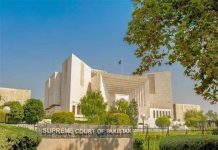By Adnan Rafique
ISLAMABAD: Accountability laws have been successfully used to change political loyalties, ruled the Supreme Court in its 83-page judgement issued on Monday, on the decision to grant bail to PML-N stalwart Saad Rafique, while raising questions on the conduct of NAB. “Pygmies were selected, nurtured, promoted, and brought to prominence and power. People with notorious backgrounds and criminal credentials were thrust to rule us in various capacities with predictable results,†states the writ order.
Giving detailed reasons for its short order dated March 17, 2020, whereby it granted bail to Pakistan Muslim League-Nawaz (PMLN) leader Khawaja Saad Rafique, a bench of the Supreme Court of Pakistan, headed by Justice Maqbool Baqar and comprising Justice Mazhar Alam Miankhel, raised serious concerns regarding NAB’s conduct.
The apex court observed that accountability laws were successfully employed as tools to change political loyalties, for splintering and fracturing political parties. Penned by Justice Baqar, the judgment begins by quoting British political economist and philosoper JS Mill: “A state which dwarfs its men, in order that they may be more docile instruments in its hands even for beneficial purposes –will find that with small men no great thing can really be accomplished†.
Dilating on the role of accountability laws throughout our history, Justice Baqar observes that, “Rather than doing any good to the country or our body politic and cleansing the fountainheads of governance, these laws, the manner in which they were enforced, caused further degeneration and created chaos, since the same were framed and applied with an oblique motive of arm twisting and pressurizing the political opponent into submission, subjugation and compliance, so as to remove them from the public scene at least temporarily. These laws were successfully employed as tools to change political loyalties, for splintering and fracturing political parties. Pygmies were selected, nurtured, promoted, and brought to prominence and power. People with notorious backgrounds and criminal credentials were thrust to rule us in various capacities with predictable results†.
The court further observes that: “We have come to this unfortunate pass, in most part, because of the repeated direct unconstitutional interventions and manipulations by undemocratic forces. Lust of power, desire to capture and rule and pursuit of self-aggrandization have resulted in violation of prescribed jurisdictional limits and ceding of political space in governance†.
The written order goes on to say, “Thus, any deprivation of liberty or curtailment of rights guaranteed by the constitution has to be adequately justified on the touchstone of the principle of proportionality, unreasonableness and necessity. While dealing with the question of whether or not bail is to be granted to an accused, it has to be kept in mind that the object of bail is to secure the attendance of the accused at the trial. The object is neither punitive nor preventive†.
The bench lamented that despite 72 years since the creation of Pakistan and 47 years since the Constitution of Pakistan was adopted, the country has “not been able to realise the spirit and essence of the ideals set out
therein. To the contrary, we have even failed to adhere to some of its most basic commands and prescriptions”.
The writ order observed that the people of the country are frequently denied rights guaranteed to them by the constitution. “Principles of equality, fairness, tolerance and respect for democratic norms are flouted with impunity. Dogmatism, intolerance, nepotism, cronyism, incompetence, regression, deception, false pretence, self-projection, misplaced sense of superiority, different biases, and prejudices, and corruption have seeped into our society and have now inundated it.”
According to the apex court, “Efforts, whenever made for the supremacy of the constitution, and the rule of law have been thwarted with full force. The principle of trichotomy of power and the concept of devolution have been trampled with contempt. Arrogance, self-righteousness and apathy are ruling the roost. We have come to this unfortunate pass, in most part, because of the repeated direct unconstitutional interventions, and manipulations by undemocratic forces”.
The apex court further pointed to “violation of the prescribed jurisdictional limits and ceding of political space in governance” motivated by desires of power and to rule. This, according to the writ order, “is further aggravated by the exclusion of grass root representation of the people in local government.”
“Public welfare and poverty alleviation are at the lowest rung of our priorities. The wide spread suppression of dissent is another anathema to our democracy. An egalitarian order remains a distant dream,” notes the court. The judgement held that the case in question (Rafique’s) was “a classic example of trampling fundamental rights, unlawful deprivation of freedom, and liberty and the complete disregard for human dignity as guaranteed by the Constitution”.
According to the court, “NAB’s [National Accountability Bureau] conduct throughout this case is a clear manifestation of their utter disregard for law, fair play, equity and propriety”. The court upheld that while combating corruption is a noble cause, “the means, process and mechanism employed therefore should be within the parameters as prescribed and mandated by the law and not in derogation thereof”.
“The bureau seems reluctant in proceeding against people on one side of the political divide even in respect of financial scams of massive proportion while those on the other side are being arrested and incarcerated for months and years without providing any sufficient cause even when the law mandates investigations to be concluded expeditiously and trial to be concluded within 30 days. Nonetheless, investigation is often not concluded for months and cases remain pending for years,” observed the court, while referring to frequent allegations of NAB being used for political engineering.
The court observed that this is not in the national interest and to the contrary is causing “irretrievable harm to the country”. Referring to the power of arrest held by the bureau, the court noted that the powers should not be deployed as a tool of oppression and harassment but should excercised with care and caution. “Arrest of a person has to be justified not only by referring to prima facie evidence and adequate actionable material sufficiently connecting the person with the offence/crime complained of, but also by showing that in the given circumstances, there were no other less intrusive or restrictive means available,” read the writ order.





